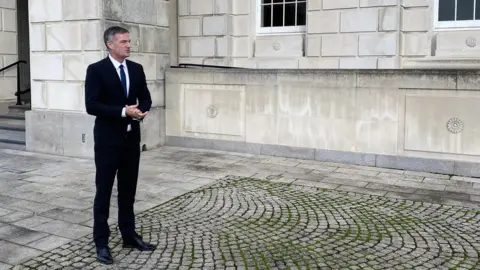Troubles legacy plans 'should be scrapped', shadow NI Secretary says
 BBC
BBCThe government should scrap its current proposals on dealing with the legacy of the Troubles, the shadow Northern Ireland Secretary has said.
Peter Kyle said a "complete rethink" was required.
In July this year, the government said it wanted to legislate in autumn on a plan to end all Troubles-era investigations, prosecutions, inquests and civil actions.
The idea has been rejected by all NI parties and victims' organisations.
"I feel very strongly that this is being done from the top down," Mr Kyle told BBC News NI's Good Morning Ulster.
"They [victims] have been completely excluded from this process, we need to actually scrap the current process and have a complete rethink about how we move forward with the legacy issues.
"It should be with the people who have survived and the victims of the Troubles in the driving seat. Currently they are not even in the car.
"We need to make sure that we as politicians can be led by victims in how we move forward."
Mr Kyle replaced Louise Haigh as shadow Northern Ireland Secretary following a reshuffle within the Labour Party.
Ms Haigh made headlines last month when she said Labour should be neutral if there was an Irish unity referendum.
Her remarks were criticised by unionist politicians, including the leader of the Democratic Unionist Party (DUP) Sir Jeffrey Donaldson, who said the UK government should never be neutral on the issue.
Mr Kyle said on Wednesday there was no sign a border poll was imminent and that Labour would "respect the spirit of the Good Friday Agreement and that means that Northern Ireland has to be master of its own destiny".
He said he was "extremely respectful of the unique political, historical and cultural challenges that are faced by people here across Northern Ireland".
"The politics of Northern Ireland are unique and they need a unique response from Westminster," he added.
"You do not need me coming in from Westminster and dictating terms on constitutional issues here or seeking to influence them in a very overt, strident way.
"I will be a serious partner for the businesses, people and society in Northern Ireland - it will be a partner, it certainly won't be me trying to dictate to them the terms of anything."
